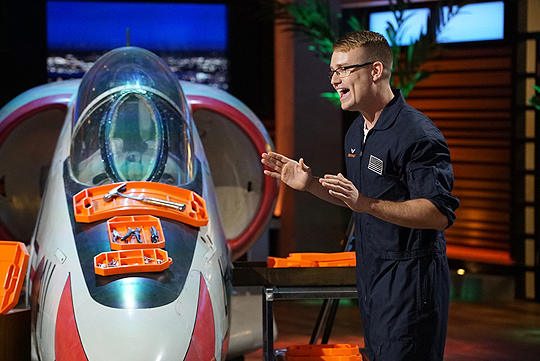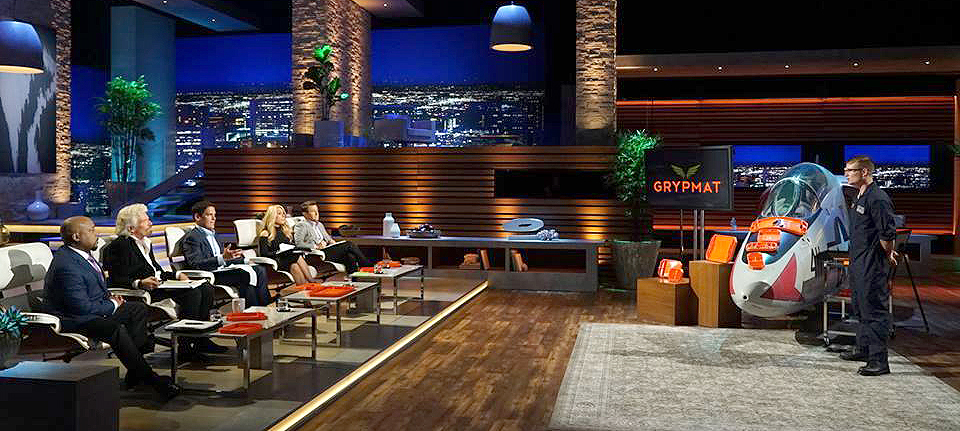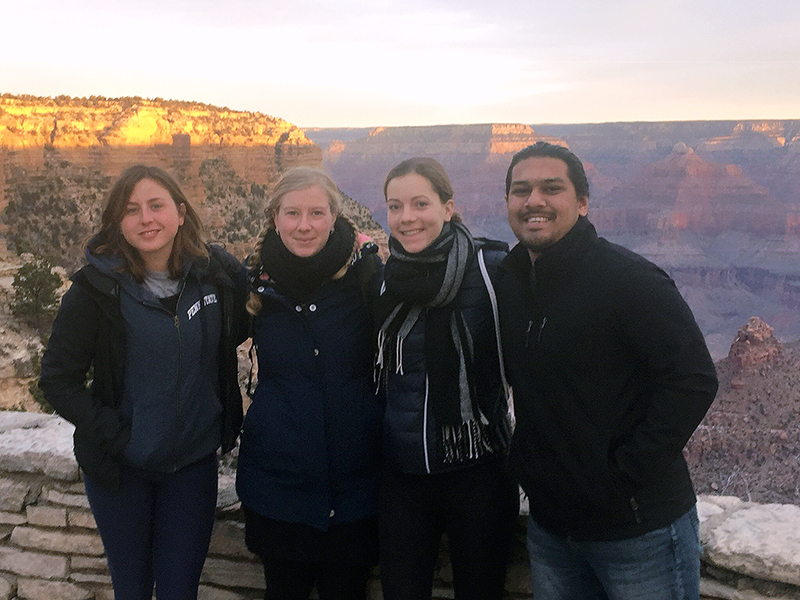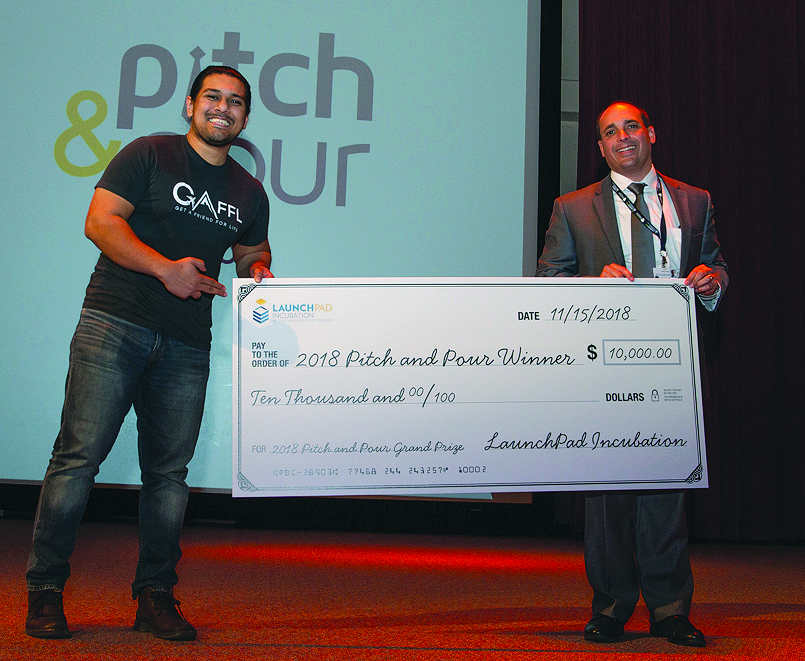Boosting business ventures
UToledo incubator helps entrepreneurs reach beyond ideas
By Laurie B. Davis
Entrepreneurs are full of ideas. When they see problems, they want to solve them. If their solutions could potentially benefit thousands or millions of people, that’s when they see opportunity.

Two University of Toledo directors, Brian Genide and Norm Rapino, offer their expertise in entrepreneurial ventures to guide students and faculty and staff members through a process that Genide says, “can increase their chances of success exponentially.” Their assistance is more than a bargain; it’s free to members of the University community.
“Ideas don’t make money,” says Rapino, executive director of Rocket Innovations at UToledo. “The venture you build around the idea is the system that delivers the product and makes the revenue. It’s a system that turns an idea into a sustained revenue model.”
 Rapino and Genide, director of incubation and venture development for UToledo’s Launchpad Incubation program, meet regularly with creative people who want to build on their ideas. “There are individuals out there who have an innate entrepreneurial attitude,” says Genide. “These are people, who, every day in their lives, look for problems, and in their heads, they come up with solutions. ‘Oh, there’s a problem. I can come up with something to fix that.’ What Norm and I do is train them how to do it the right way.”
Rapino and Genide, director of incubation and venture development for UToledo’s Launchpad Incubation program, meet regularly with creative people who want to build on their ideas. “There are individuals out there who have an innate entrepreneurial attitude,” says Genide. “These are people, who, every day in their lives, look for problems, and in their heads, they come up with solutions. ‘Oh, there’s a problem. I can come up with something to fix that.’ What Norm and I do is train them how to do it the right way.”
Between 2014 and 2018, the LaunchPad engaged more than 250 entrepreneurs, created nearly 260 jobs, and generated nearly $30,000,000 in sales revenue and professional investment within the northwest Ohio region. Currently, Genide and Rapino advise 26 clients, and the Launchpad has five successful program graduates.
Solution to Simple Problem Takes Off

Burden’s accomplishments began with what he calls “a simple problem that was wasting a lot of time. When I was with the 180th Fighter Wing in Swanton, my tools were sliding off the aircraft. I was really frustrated for not having a good place to set my tools, he adds. “You can’t put your tools inside the jet, you can’t put them in your pocket, you can’t wear a tool belt, if you set them on top of the aircraft, they’ll just slide off. So, you’d be constantly running up and down the ladder. As a UToledo student, I decided I was going to solve this problem.”
Burden says the Launchpad Incubation team helped him correct his approach with potential customers. “It’s something I was doing wrong for a long time,” says Burden, “but they helped me square that away.” He says following the Business Model Canvas — a customer discovery method backed by the National Science Foundation and used by the Launchpad — he was able to ask the right questions that would cut through any bias when visiting the 1,000 aviation mechanics he identified as possible buyers.
Perhaps more importantly, the Launchpad found funding for Burden to produce the Grypmat. “Without their funding, it would have been extremely difficult,” he says. He also won the Launchpad’s annual Pitch and Pour competition in 2014, taking home a $1,500 prize. Since then, he also has judged the business venture pitch competition.

Already, NASA centers on the West Coast use Grypmats, he says, as does Virgin Orbit, a Richard Branson-owned company that launches satellites. Branson invested $120,000 in Grypmat when Burden hooked three sharks on the popular TV show, “Shark Tank.” The three “Shark Tank” investors — Branson, Mark Cuban and Lori Greiner — who backed Burden’s Grypmat with a total of $360,000 — each own 10% of the company.
‘Get a Friend for Life’
If you seek adventure via travel — like hiking in Rocky Mountain National Park, or maybe visiting Iceland’s geothermal spas or exploring the island of Tasmania — but prefer not to go it alone, entrepreneur Akib Amin (Eng ’16) can link you to fellow travelers through, GAFFL, a travel buddy app. “If you are traveling to a U.S. national park or even to Europe or another country, you can find others who are going there at the same time as you,” says Amin. “So, you connect, split costs and explore together.”

Amin, who is from Bangladesh and now lives in Toledo, thought of the idea for GAFFL while hiking in Colorado. He says he noticed that sometimes he would see the same person in different places along his route. “If you knew that guy was going to be in the same place at the same time you were, do you think he would be interested in saving money by grouping up? I think a lot of people would. That was my idea, and actually it’s happening now,” says Amin.
As he and his team, including his childhood friend, Shakil Mahmood, and brother, Abrar, develop the mobile application, the business operates via its web app. “We have users from more than 150 countries. This has all happened through word of mouth,” says Amin. “At first, some people would say, ‘Oh it’s so risky, it’s strangers,’ but the market has proved all of the doubters wrong,” says Amin.
“As we’ve become post-revenue and are growing, we are looking into how we can make the product even better, even safer and more trustworthy,” says Amin. “We have a top-notch technical team, we are building a marketing team, and we just became approved employers at The University of Toledo and the University of Michigan.” Amin says they hope to hire interns from the two universities and find young students who want to learn how to create a startup. They also want to potentially hire those aligned with the GAFFL goals.
“Me and my team bootstrapped our startup for the first 16 months,” says Amin. About one year into running the website, it started attracting a lot of users, says Amin, and people began sharing photos of their trips. “We went to the edge,” says Amin, who had spent down his savings. The team discussed their options. “We either go post-revenue or we find another way to manage finances. No one was backing us while we were pre-revenue,” says Amin. They began to charge users to connect with other travelers, and they paid.
GAFFL uses a pay-as-you-go model. Users pay $6.99 (USD) to create unlimited connections with travelers for 30 days. There also are value packages, $20 for six months and $30 for one year.

“What we’re trying to do with GAFFL is a mission,” says Amin. He wants to scale it up and help users across the globe “get a friend for life” while saving money on their explorations. “Ten years ago, Airbnb didn’t think people would be able to just type in Peru and find homes to stay at in Peru. Today people can do that,” he says. Amin’s vision for GAFFL users would be to find a traveling companion anywhere across the world within three to four minutes.
“As the world becomes more and more open, these types of products will do better,” says Amin. The benefits, he says, are certainly social but also environmentally friendly. “You are making amazing friends all over the world, and if you can use one car instead of four, you are cutting down on carbon emissions times four.
“This is what keeps us going.”






